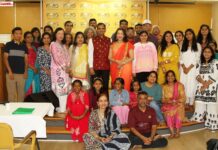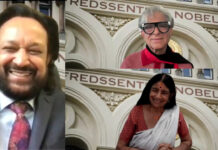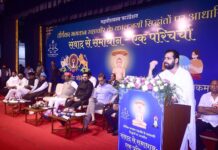We often look forward to reading our horoscope in the newspaper

or ask palmists to read our hands. It is also quite exciting to visit astrologers with our curiosity to know what the future holds in store for us. Commonly we refer to this subject as destiny and at times say “we will get what is destined.” So what really is destiny and how does it influence the course of our lives?
Different people have varied opinions regarding destiny and what role it plays in our lives. While some believe that destiny is thrust upon us, others believe destiny is a matter of past karma. Some others may give no significance to this at all. In this article Swami Mukundananda explains the meaning of destiny and how it influences our lives. More importantly, through the knowledge of scriptures, he dispels some common misconceptions associated with the concept of destiny and encourages everyone to perform their duties with utmost sincerity and hard work.
Question: We are all born with a destiny, and this cannot be changed, which is the basic principle of the Law of Karma. Is this understanding correct?
Swami Mukundananda: To think that we are bound by our destiny, which cannot be changed, is the doctrine of fatalism. This is how the “fatalism” is defined:
1. Doctrine of fate: The philosophical doctrine according to which all events are fated to happen, so that human beings cannot change their destinies.
2. Belief in all-powerful fate: The belief that people are powerless against fate.
3. Feeling of powerlessness against fate: An attitude of resignation and passivity that results from the belief that people are helpless against fate.
Let us analyze whether this concept of fatalism is correct or not. First of all, let us understand what destiny is:
Poorva janma kritam karma taddaiva mitikathyathate (Hitopadesh)
“The actions we performed in our past lives become our destiny in this life.” In other words, destiny is not something that has come down from the heavens or a horoscope chart that is revealed to us by the astrologers. We have created our destiny ourselves by actions in past births. This means that we performed actions with our free will in past lifetimes.
Now, we shall use the technique of “Reductio ad absurdum” to disprove fatalism. This is a technique where the statement to be disproved is accepted in the premise. Then it is shown to lead to a logical inconsistency. Let us start with the premise that everything is predestined.
• If we are bound by destiny in this life, and cannot perform actions by our own volition, this rule must apply to our past lives as well.
• It would mean that in past lives too we were bound by destiny, for the rule must be the same in all lives.
• But if, in each life we were bound by destiny, then in which life did we perform independent actions that created the destiny?
• And if in no past life did we perform actions with our free will, then how was destiny created?
• Again, if we did actions with our free will in any past life, we can do them now as well.
Thus, we see the premise that everything is predestined, leads to a logical absurdity, and is disproved. The scriptures say that it is lazy people who blame destiny for their substandard achievements:
Daiva daiva aalsi pukaraa (Ramayan)
“While working, don’t bring destiny into your mind, or it will make you lazy.” If you do, you will start running to astrologers to know what your destiny is, rather than focusing on performing your work properly.
It is a fact that there is an element of destiny. However, we also possess the freedom to act as we wish. If you were destined to win a jackpot of a million dollars, you will win it. But beyond that it is your self-effort. If you work hard, you could multiply it into ten million dollars, and if you develop profligate habits, you could squander it away in drinking and gambling. That would not be decided by destiny; that would be your own purusharth (self-effort).
Q: If all outcomes happen due to one’s Karma, and God gives the results, when ill befalls people, like the terrorist attack in Mumbai, will it be correct to say “they deserved it due to past karmas,” and blindfold ourselves from the misery of humankind?
SM: The Law of Karma is so complex that it involves multiple factors. To start with there are three kinds of karmas: sanchit, prarabdh and kriyamaan.
God has an account of all our karmas in endless lives. This is called sanchit karmas. At the time of birth, we are given a portion of our sanchit karmas, to enjoy or suffer in this life. This is called prarabdh karmas. The prarabdh is fixed, but within this life, we have a freedom to act, and the actions we perform are called kriyamaan karma. The kriyamaan is not pre-determined; it is in our hands, and can be changed as we wish.
Now, the results we get in life are dependent on a number of factors, including:
1. Our prarabdh karmas.
2. Our kriyamaan karmas.
3. The Will of God.
4. The karma of other people present in that situation.
5. Chance events -in which we happen to be present by accident.
Since we humans are not all-knowing, we cannot fully correlate the results we get with the exact causes behind them. Besides we do not even know all our past karmas, to make a perfect correlation.
There is no blanket answer to this question whether the deaths of the people in the Mumbai terrorist attack were because of their karmas or not. It is possible that they were destined to die, and a matter of chance that they died in a terrorist attack. Else it could be a result of any of the other factors listed above. It is not for human beings to know which of the above five factors were responsible for their deaths.
Even in the aforesaid terrorist attack, many people were miraculously saved. Some were scheduled to attend meetings at those very hotels, but for very strange reasons, they could not reach there on time. Yet others happened to come there, equally accidentally. There are many mysteries in creation that will remain mysteries until we become God-realized. Let us leave the question of who died for what reason to God.
But, merely because we cannot understand the specific reasons for them, we must not neglect efforts to counter social evils such as terrorist attacks. We must put in our best efforts and then leave the results to God. Thus, the Saints teach us:
Prayatna mein saavdhan, phal mein santusht
“Act responsibly, but do not be disturbed if the results are not as you wish.”
Q: Should one believe in astrology? Do planetary aspects affect our life?
SM: The configuration of stars does have a minor influence in our lives. It is a part of God’s design for dishing out our prarabdh, or the results of our past karmas. The subject of astrology attempts to predict this influence of stars. Regarding astrology, the first thing to bear in mind is that the predictions are only partially effective.
The second point is that we always have the freedom to act in the present. This freedom permits us to change our destiny, with sufficient self-effort. The problem with studying astrology is that it makes us fatalistic. We lose focus on our self-effort, or purusharth. Hence, Chanakya Pandit said:
Nirutsahad daivam patitah
“If you are torpid in your effort, you will fail despite the best of destiny.”
Utsahavataam shatravopi vashibhavanti
“If you endeavor is sufficient, you can transform even bad destiny into success.”
Q: When the astrologer tells us our destiny, we can prepare ourselves for it. So it seems to be advantageous to know what destiny has in store for us. Isn’t it very beneficial to go to astrologers?
SM: Even if the astrologer’s predictions are accurate, they are usually disadvantageous to know. Let us suppose the astrologer informed you that after two years your business will increase manifold. On hearing this, your natural response will be, “Oh is that so? Then I do not need to work very hard. I am going to succeed in any case.” In other words, if you come to know of a good destiny, you will reduce your efforts for success.
Now consider what will happen if the astrologer says that your business will crash after ten years. On hearing this, you will think, “Really, my business is going to crash? O God, what will I do? What will I do? What will I do? …” Whether the business crashes or not, premature worries will make your heart crash.
In this way, on being told a good destiny, you will become lazy, and on being told a bad destiny, you will become worried. So there is no advantage in knowing your destiny. Whatever is written in it, will come by itself.
The present is in your hands, and your duty is put in your best efforts now. Focus on making your destiny rather than knowing it.
Besides, the astrologer’s predictions are only partially accurate. In Kaliyug, the present age, there are hardly any expert astrologers. With their rudimentary knowledge, they make guesses.
A small portion of their predictions turn out right, and their business keeps running. I remember a joke about this. Khushwant Singh, was the Editor of “Illustrated Weekly”, which was India’s number one news magazine in the 1970s. He confessed later that his astrologer, who wrote the Zodiac predictions of the week, had left the job.
Thenceforth, for the next three years, Khushwant Singh did not hire another astrologer; he would write the predictions himself. Unaware of this, people would often pay compliments about the accuracy the astrological predictions of his magazine.
So a good policy is to take the predictions of astrologers with a pinch of salt, and instead focus on your efforts. A famous Urdu poet put it very aptly when he said:
Khudi ko kar buland itna ki
har takdir se pehle,
Khuda khud bande se puche
bata teri raza kya hai
“Make your efforts so strong, that before giving you the results of your destiny, God Himself asks you what you want.”
Swami Mukundananda is a world renowned spiritual teacher from India, and is the senior disciple of Jagadguru Shree Kripaluji Maharaj and founder of JK Yog. He has received his degrees in engineering from world renowned institutes in India, IIT and IIM. He has inspired people all over the world on the path of spirituality, holistic health, yoga, meditation, service to society and God realization. This year, Swamiji will be conducting weeklong programs in 30+ cities of USA from April onwards. For more information visit: http://www.jkyog.org/
Swami Mukundananda






